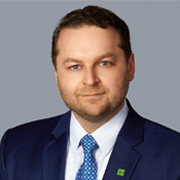Gennadiy Goldberg: Welcome and thank you for joining us today. My name is Gennadiy Goldberg and I'm a senior US rate strategist at TD Securities and I'm very pleased to welcome Thiébaut Julin, Chief Financial Officer of Agence France locale, or AFL in France. Over a year has now passed since the start of COVID. Parts of the world are certainly busy reopening. Unfortunately, others have not been quite so lucky, so our conversation today is really meant to gain a little bit of perspective on how COVID may have changed things in both the short and long run. I'm also very pleased to welcome my co interviewer, Laura O'Connor from our Debt Capital Markets team, who I'll ask to introduce our guest today.
Laura O'Connor: Thank you, Gennady and welcome Thiébaut, who's joining us today from Lyon in France, which is home to French gastronomy, but equally important, the headquarters of Agence France Locale. Thiébaut , AFL is a relatively new institution receiving authorization to fund local authorities In 2013. How did COVID-19 impact your vision of AFL mission?
Thiébaut Julin: AFL, as you know, entered into the capital market, recently in 2015. First of all, with an inaugural transaction in Euro, followed by six other annual benchmark transaction of approximately €500 million each and several prior placement in different currencies. As a new member of the group of local government funding agencies, AFL has been a committed to be regularly and increasingly active as an issuer in capital markets, thanks to its high quality ratings and its status of Public Development Bank recognized recently in March 2020. With regard to the to the impact of the COVID-19 crisis; I would say the crisis has demonstrated the relevance for French local authorities to be the owner of an institution fully dedicated to support the financing of their capital expenses. As such, a fail as a tool that provides funding diversification to local authorities may prove critical in difficult market circumstances, whether economic or financial, or health, as we've known in in in 2020, if other sources of financing suddenly were to dry up.
Gennadiy Goldberg: And how has your balance sheet changed since 2019 and since COVID-19.
Thiébaut Julin: In 2020, actually, the bank's balance sheet grew substantially by 32% up to €5.7 billion, essentially driven by the loan production with an outstanding loan book that amounted to €3.8 billion at the end of 2020, and financing commitments up to €400 million. In fact, these figures have been in line with the banks' at 2020 forecast issued in 2019.
Laura O'Connor: Thank you, Thiébault, and coming to financial markets. Do you think there has been an irrevocable change in financial markets since the onset of COVID-19?
Thiébaut Julin: I would say yes, certainly the massive support of central banks has enabled the functioning of capital markets since March 2020. Indeed, all economic agents, whether governments, banks, corporates, had been able to find themselves without suffering from a market dislocation that was looming in March 2020. From now on, the challenge for Central Bank and more specifically ECB, is to start pulling out these unconventional measures. As stated last week by former ECB chief economist, the Central Bank may no longer be free to tighten policy if needed, "for fear that the political fallout on government financing of debt would be too severe".
Gennadiy Goldberg: And beyond COVID-19, what other strategic challenges has AFL overcome or made progress on over the past year?
Thiébaut Julin: In fact in the early 2020 we had three challenges. 1. Maintain the same speed of development, especially with regards to the new memberships. 2. Enter the capital market at the right time. 3. And make sure that the organization was fully operational in fully working. I can say in 2020 we've made substantial progress about these three challenges. First, 2020 was a very good vintage in terms of membership with 59 new local government joining AFL, among which very large ones bringing a substantial amount of additional committed capital. Second, AFL has been able to execute its borrowing program in very good conditions by launching its inaugural sustainability bond benchmark and several long to very long dated private placement in Euro or foreign currencies. And third, the organization is proved adequate with mandate given by the shareholders to AFL; lean, operationally efficient and high tech driven.
Laura O'Connor: Thank you Thiébault, and congratulations on the inaugural sustainability bond. I think the growth of the ESG market we have seen is very apparent during COVID-19 and everyone has a bit more heightened awareness. What do you think will be the lasting lessons of the COVID-19 experience?
Thiébaut Julin: To me, there are three lessons. One is the role of central Bank and specifically ECB in the Euro Zone. The response was massive, was very quick, as opposed to the 2008 and 2010 crises. To me, the ECB has become a federal institution.
The second is the European initiative. The European Council of July 2020 has put in place a large and comprehensive recovery package; the next Generation EU; which is a major step forward in the infrastructure build up of European institution. It also has demonstrated the capacity of 27 countries to put together a unique response to the challenges raised by the health and economy crisis. And third, tele-working in the banking industry, and I would say generally in service industry, is just going to develop in the 21st century as technology supports this major shift.
Gennadiy Goldberg: That's great and certainly agree with many of your takeaways as well. Thank you for joining our conversation today.









